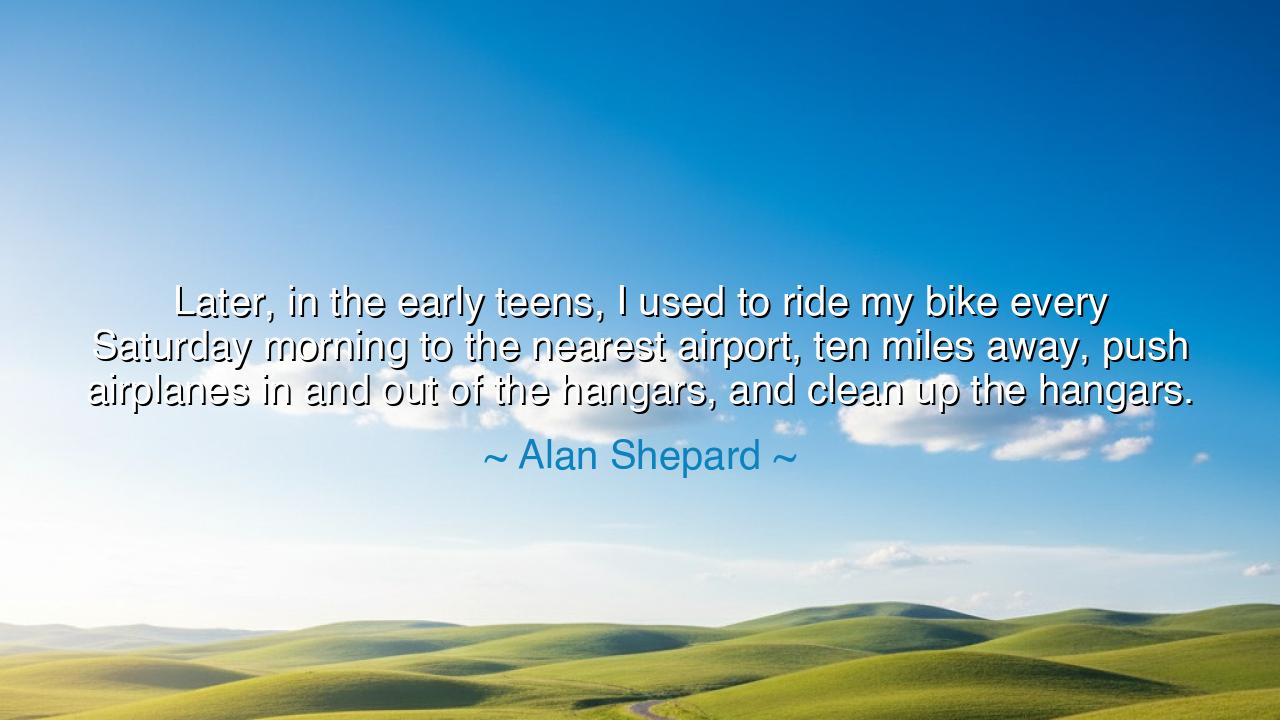
Later, in the early teens, I used to ride my bike every Saturday
Later, in the early teens, I used to ride my bike every Saturday morning to the nearest airport, ten miles away, push airplanes in and out of the hangars, and clean up the hangars.






The words of Alan Shepard, “Later, in the early teens, I used to ride my bike every Saturday morning to the nearest airport, ten miles away, push airplanes in and out of the hangars, and clean up the hangars,” carry the fragrance of youth, discipline, and the humble beginnings of greatness. They remind us that the path to the stars often begins not in glory, but in labor—not with fanfare, but with chores done in silence. The boy who pedaled ten miles to sweep floors and move planes was already, though he did not know it, preparing himself to one day step beyond the sky and become the first American in space.
The origin of this saying lies in Shepard’s own restless hunger for flight. Long before he wore a space suit, he was a boy on a bicycle, rising early when others slept, drawn not by wealth or reward, but by fascination with the miracle of airplanes. His words reveal the simple truth that greatness begins with small acts of devotion. Each push of a plane, each broom across a hangar floor, was a gesture of respect to the dream that stirred in his heart. He did not begin by flying; he began by serving. And from service, he learned the patience, humility, and discipline that later carried him to the heavens.
History too is filled with such beginnings. Leonardo da Vinci, the master of flight in imagination long before Shepard touched the skies, spent his youth apprenticed in the shops of others, grinding pigments and sweeping workshops before he ever painted or designed. His greatness was born in menial work, as Shepard’s was in the dusty hangars. We often admire the final glory, but forget the hidden years when the dreamer labored in obscurity, fueled only by curiosity and desire.
There is also the lesson of Thomas Edison, who as a boy worked on trains, selling newspapers and candy, tinkering in small corners before he lit the world with invention. Like Shepard, he was drawn to his craft before he was honored for it, and in the act of service, he prepared his mind and spirit for innovation. These stories reveal that what seems ordinary—the pushing of planes, the cleaning of hangars, the sweeping of floors—is in truth the training ground for the extraordinary.
The lesson is clear: the pursuit of greatness is not first about triumph, but about devotion to the small tasks that build character. Shepard’s bicycle rides were not glamorous, yet they were heroic in their own way. They demanded endurance, consistency, and a willingness to labor without immediate reward. So too in our own lives, it is often the unseen efforts, the early mornings, the long commutes, the humble tasks, that prepare us for the moments when destiny calls.
Practically, this teaching bids us to honor our beginnings. Whatever your dream may be, do not despise the small steps or the lowly tasks that seem beneath you. Embrace them as Shepard did, with reverence, for they are shaping your spirit. Show up when others sleep. Work where others will not. Give your energy not only to what shines, but to what builds. For the one who tends faithfully to small duties will be prepared when greater opportunities appear.
So, beloved listener, let Alan Shepard’s words be a beacon: ride your bicycle to the dream, even if it is ten miles away; push the weight, sweep the floor, clean the hangar. Do not wait for glory to begin, for glory is born in these hidden labors. And when the day comes that you, like Shepard, are called to step into greatness, you will find that the strength you need was built long ago, in the quiet hours of humble work. Thus, the boy who once swept the hangars became the man who touched the stars.






AAdministratorAdministrator
Welcome, honored guests. Please leave a comment, we will respond soon